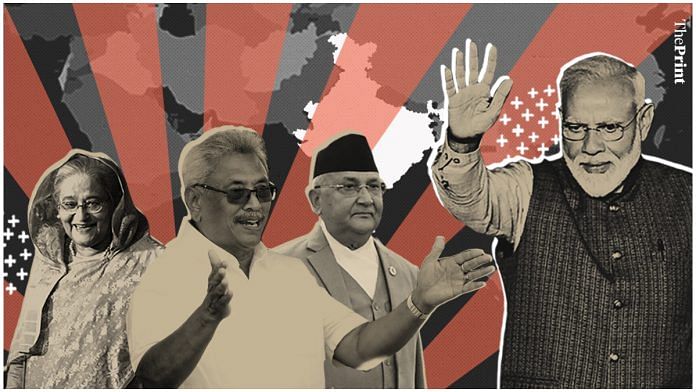With Sri Lanka (Gotabaya Rajapaksa), Nepal (K.P. Sharma Oli) and Bangladesh (Sheikh Hasina) electing strong leaders with massive mandates, India can have a tough time asserting its supremacy. India will also have to step up its trade, infrastructural and political engagements with its neighbours and compete with China for influence in South Asia.
ThePrint asks: With strong leaders like Rajapaksa, Hasina, Oli, is India losing dominance in South Asia?
False assumption that India is dominant only when leaders in Sri Lanka, Nepal and Bangladesh are weak
 Kanwal Sibal
Kanwal Sibal
Executive council member, VIF, and former foreign secretary
India will remain the dominant power in South Asia for the foreseeable future because of its geographical and demographic size, its vastly bigger economy, military, scientific and technological strengths, besides its civilisational and cultural weight.
The assumption that India becomes more dominant when the political leaders in Sri Lanka, Nepal and Bangladesh are weak and loses dominance when leaders there are strong is not borne out by facts. Sri Lanka, Nepal and Bangladesh have always been difficult neighbours, irrespective of which governments have come to power there.
Nepal has always played the China card against India and has refused to cooperate with us on water resources, besides stoking anti-Indian sentiments to serve domestic political ends. India’s relations with Bangladesh have been very difficult because of issues such as water-sharing, safe-haven given to anti-Indian insurgencies, denial of transit rights, etc. But under Sheikh Hasina, India-Bangladesh bilateral ties have been the strongest ever.
Sri Lanka has always kept India at bay. It has played the China card against us and the unresolved Tamil issue has further deteriorated India’s relations with Sri Lanka.
India has dealt with these South Asian countries far more generously than other big powers have done with their smaller neighbours. India’s approach has been that of cooperation, not one of domination. PM Modi, a strong leader, has actually considered his South Asian counterparts as sovereign equals.
India must not be seen as Big Brother. It needs to engage with its South Asian neighbours rather sensitively

Talmiz Ahmad
Former Indian diplomat
South Asia is extremely important for India’s national security interest. India is the largest country in this subcontinent and there has been the perception that it has dominated the region culturally and economically. Therefore, India needs to engage with its South Asian neighbours rather sensitively.
During the British rule, the Indian government had inherited an imperial mindset. This mindset has harmed India’s relationship with its neighbours. These bilateral relations should be maintained on the basis of mutual respect and non-interference in their internal politics.
At the same time, India has every reason to be concerned and its interests must not be jeopardised. These issues can only be solved by diplomatic engagement with our neighbours. This must be done in a positive way with respect to the economic order. India must not be seen as the Big Brother.
On China reaching out to India’s neighbours, it is important to understand that no country can have exclusive ties with another country. These relationships can be competitive in nature. Historically speaking, these countries were a part of the larger Indian subcontinent. India must build on that sentiment as it brings a shared history and culture to the table.
There should be an emphasis on sovereignty and the understanding that our neighbours can pursue their domestic politics as they please.
Subcontinent is not ‘India’s own backyard’. Neighbours will continue to pursue foreign policies independently
 Pranay Kotasthane
Pranay Kotasthane
Head of research, The Takshashila Institution
Strong leaders or not, these sovereign South Asian states will continue to pursue their independent foreign policies based on their strategic priorities. The subcontinent is not ‘India’s own backyard’. There’s no need to judge every political change in these countries based on how it will affect India’s ‘dominance’ in South Asia.
Structurally, it is natural for these states to play India off against the other powerful economy, China. In fact, smaller states across the world tend to balance their relationships with bigger powers.
As long as these states are mindful of India’s security concerns and economic well-being, India shouldn’t be overly concerned with China’s presence. Given China’s overbearing foreign policy approach, it is likely to establish itself as a primary object of hate among India’s South Asian neighbours soon. India must instead do enough to be the second-best option for every smaller nation.
From the perspective of these states, both India and China have their comparative advantages. China has more economic wherewithal whereas geographical proximity makes India irreplaceable for them.
Therefore, the emergence of strong leaders in Sri Lanka, Bangladesh and Nepal should not be seen as a zero-sum game in India.
These leaders may have large anti-India mandate. But who did Rajapaksa choose to visit first?

Abhijit Iyer Mitra
Senior fellow, Institute of Peace and Conflict Studies
Two quotes come to mind, one by former Nepal Prime Minister Sushil Koirala who said: “We are surrounded by two dogs, one to the north bites but never barks. The other to the south barks but never bites”. Former Mexican President Porfirio Diaz said: “We (Mexico) are so far from God but so close to the United States”.
India’s relationship with its neighbouring countries is constantly oscillating like a pendulum. However, it should be noted that India has a big presence in the subcontinent. These countries should make proactive efforts to connect with India. The leaders in those countries may have a large mandate, evoking fears by fueling anti-India sentiments. But who did Rajapaksa choose to visit first?
Why do we assume that other countries won’t play diplomatic games like India?
On China’s engagement with our neighbouring countries, we need to understand that India can’t outspend China on international projects. China is offering soft loans to these countries, which are nothing but a debt trap. At the same time, we can’t compete with China and we need to wait for the countries to counterbalance.
I am quite happy that China has introduced these debt trap projects. In case the smaller countries don’t repay the debts, China is left with only two options. It may have to either forgive the debt or invade and recuperate. There is a possibility of China exhausting its resources and ending up like the erstwhile Soviet Union.
Also read: India only cares about national interest. And Nepal has been at the receiving end of it
By Kairvy Grewal, journalist at ThePrint




Indian political elites should come out of the Box of the Colonial-Master-Syndrome! If India continues the colonial policy of divide and rule among its neighboring nations, they will have to look towards the West for the neighborhood! Serious issues such as making SAARC defunct, taking sides in internal politics of neighbors, border encroachment and border security forces terrorizing the people of the neighboring nations are fueling up mistrust against Indian ruling regime. It is not a good sign for a biggest democratic nation. Indian should throw away the lenses gifted by the West to look at its neighbors and the mirror to look itself. It should have biggest heart and embrace as the nation and not an Island-mindedness of its former Masters! The politicians should study, if they can, extract of Budhha’s teaching: the Harmony of Dependent Origination and do away with Island-minded political philosophy that has been guiding India against its neighbors since the Company Raj and then Nehru!
GDP growth dips to 4.5 per cent in July-Sept, hits 6-year low. India is struggling to survive and aspires to be a dominant force around at least its neigborhood. What a dream man.
The era of the Monroe Doctrine in South Asia has passed into history. China has been growing like a scalded rabbit for forty years, giving MEA plenty of time to adjust to new realities. Unlike the Soviet Union which was geopolitically powerful but economically weak and almost irrelevant to most of the world outside the Warsaw Pact, China does more business in Asia with its most important countries than the United States. That holds true for South Asia, where we have, in our wisdom, made SAARC defunct. 2. India needs to reorient its neighbourhood policy. Perhaps end this petulant stand off with Pakistan. Join RCEP if Act East is not to be a cliche. We should also be the good guys, when posited against China. Sadly, even that moral edge is getting blunted. We should read what a “ newspaper in New York “ is saying about us a little more thoughtfully.